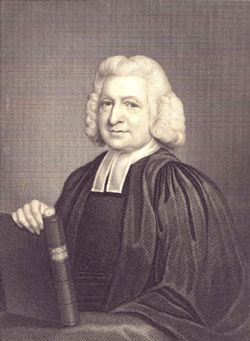And can it be that I should gain
An interest in the Saviour’s blood?
Died He for me who caused His pain,
For me who Him to death pursued?
Amazing love! How can it be
That Thou, my God, shouldst die for me?
He left His Father’s throne above,
So free, so infinite His grace,
Emptied Himself of all but love
And bled for Adam’s helpless race.
‘Tis mercy all, immense and free,
For, O my God, it found out me.
Long my imprisoned spirit lay
Fast bound in sin and nature’s night;
Thine eye diffused a quickening ray;
I woke; the dungeon flamed with light.
My chains fell off, my heart was free,
I rose, went forth, and followed Thee.
No condemnation now I dread;
Jesus, and all in Him, is mine.
Alive in Him, my living Head,
And clothed in righteousness divine,
Bold I approach the eternal throne
And claim the crown, through Christ, my own.
What a triumphant song! Many historians think this was the one of which Charles Wesley wrote in his journal: I began a hymn upon my conversion. They believe that is particularly true of verse 3 above, and its proclamation of freedom for the soul. This experience of new freedom occurred for Charles on Sunday, May 21, 1738, after some meetings led by Peter Boehler, a Moravian Christian. The thirty-one-year-old Charles said, I now found myself at peace with God, and rejoiced in hope of loving Christ. I saw that by faith I stood.
What a triumphant song! Share on X
It is surprising to know that both Charles and his brother, John, had tried to methodically live a Christian life (hence the term, Methodists ). They were both interested in spiritual things, and offered to travel to the state of Georgia in the United States as missionaries, especially to people sent to the new colony from Britain’s debtor’s prisons. They were unsuccessful in this task, with Charles particularly being too autocratic, and they returned to England in low spirits.
Both brothers came into a personal relationship with Christ about the same time – May 1738, as stated above. We can see from Charles’ hymn-writing what a difference this made in his life. And what a blessing his numerous hymns have been to the Christian church!
AUTHOR: CHARLES WESLEY MUSIC: THOMAS CAMPBELL
S.A. SONG BOOK, 2015 EDITION, # 241; 1987 EDITION, # 283
REFERENCE: MORGAN, ROBERT J.,THEN SINGS MY SOUL






